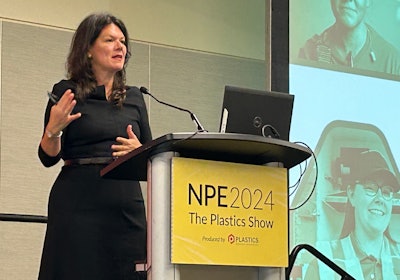
At NPE 2024, Stephanie Strategos Polis, VP, communications at the Plastics Industry Assn. (PLASTICS), shared with an audience of industry insiders how the organization’s Recycling is Real campaign is being used to address ongoing skepticism surrounding plastic recycling. This skepticism, she explained, has been fueled by a series of headlines and reports, among them a much-publicized report from Greenpeace, claiming that plastic recycling is a myth. Unfortunately, this narrative has gained traction, leading to a significant erosion of public trust in recycling efforts.
Polis began her talk by recounting a pivotal moment that sparked the Recycling is Real campaign. In 2023, as PLASTICS CEO Matt Seaholm was traveling in Minnesota, he came upon a billboard that boldly declared, “Plastic recycling is a myth.” The message, it turns out, was sponsored by a company selling reusable water bottles.
 | Read this related interview with Patrick Krieger, PLASTICS’ VP of Sustainability, “Plastics Industry Association Educates Consumers, Policymakers on Recycling” |
“We all know that makes people believe one thing, which is that recycling isn’t happening,” said Polis. “That, compiled with a lot of what has been going on in the industry and what we’re all familiar with, which is headline after headline saying things like plastic recycling doesn’t work, it isn’t happening, it’s pretend, it’s a unicorn,” diminishes the public’s faith in recycling.
The billboard, she noted, was a stark contrast to the reality that she and her colleagues know well. “We started to take it [the billboard] a little bit more personally than you’d think because over and over again, we’d say there are people working in this industry every single day. This is what they do for a profession,” said Polis. “This is an incredible industry. And the innovations and technologies that are happening in recycling are being invested in by our own people. So if I may, they’re calling a wonderful group of human beings that we represent in our association liars. That’s a problem. But moreover, it continues to degrade the understanding that recycling is happening.”
Born out of the need to counteract these negative perceptions and misinformation, Recycling is Real aims to showcase the tangible efforts and successes in plastic recycling across America. Through a series of videos, the campaign highlights the real people and processes involved in recycling, emphasizing that it’s not only feasible, but also economically viable.
One of the campaign’s key strategies is to target policymakers and legislators—at every level of government. Polis explained that misinformation about recycling is not just a public issue; it has seeped into the halls of government. Policymakers, influenced by negative reports, have begun to doubt the efficacy of recycling programs. This doubt has led to reduced investments in recycling infrastructure and a push toward banning or reducing plastic production—a scenario PLASTICS and the plastics industry is determined to prevent. The campaign also targets private-sector executives, whose decisions can significantly impact the industry.
 | Read about another presentation at NPE 2024 in this article, “CAA Provides Deadline Schedule for Brands Affected by EPR” |
The campaign’s videos serve as a powerful tool to bridge this gap. They feature real workers from recycling facilities, sharing their experiences and the pride they take in their work. “That’s something I want to touch on and I repeat myself often with this, but there are hardworking people in this industry, and they’re very proud, as we all are, of what they do when they go to work every day,” Polis said. “And so, we wanted to make sure that by showing recycling, we weren’t forgetting about the human beings behind the processes. These are the people, the plastics industry.”
One video showcases a facility in Portland, Penn., Ultra-Poly Corp., where workers are recycling producing 1 million pounds of plastic pellets day, recycling plastic from a variety of sources. The workers speak passionately about their roles and the impact their efforts are having on reducing landfill waste. “Our leader, Matt Seaholm, says it’s hard to deny something you’ve seen,” said Polis. “By showing the people who are doing it and the act of recycling happening every day, it’s very hard to deny it.”
Polis also shared a success story from Indiana, where a congressman visited a local recycling facility. The visit had a profound impact on him. He realized that 200 of his constituents were employed at the facility, working on sustainability and recycling initiatives. This firsthand experience empowered him to counter negative claims about plastic recycling when he returned to Capitol Hill. It was a clear demonstration of how direct exposure to recycling efforts can change perceptions and support the industry’s narrative.
Despite these successes, Polis acknowledged the challenges that remain. Public education on recycling is a significant hurdle. Many people are unaware of the processes involved or the advancements in recycling technology. The campaign aims to address this by providing clear, accessible information through its website and social media channels. By showcasing the sustainability efforts within the industry, the campaign hopes to foster partnerships and collaborations to further enhance recycling initiatives.
As Polis concluded her presentation, she emphasized the importance of continued engagement and collaboration. The Recycling is Real campaign is not just about changing public perception; it’s about fostering a collective effort to improve recycling rates and sustainability practices, she said. “This is something the entire industry has a responsibility to share if they’re able, because this is a story we can all benefit from.” PW
























